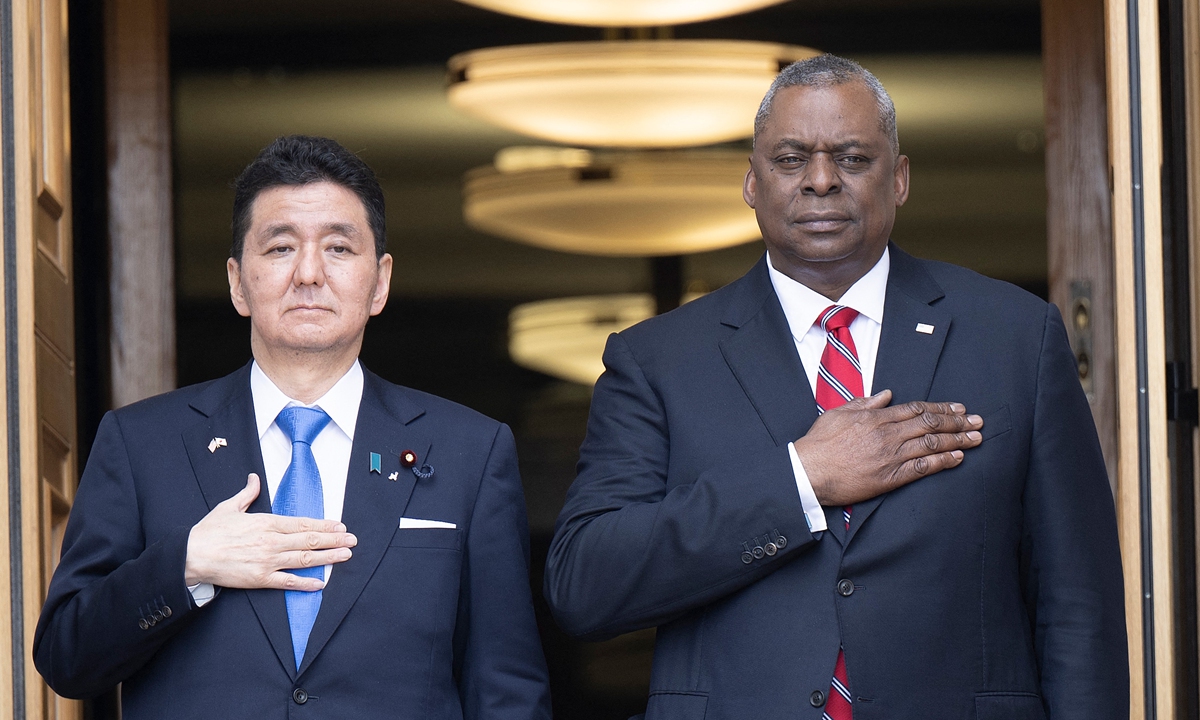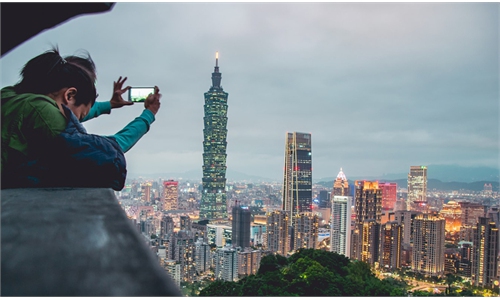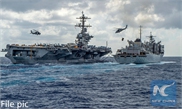US, Japan defense chiefs hype neighbors' 'threats' ahead of Biden's Asia tour, justifying own hegemony
Meeting all about justifying military buildup: experts

Japan's Defense Minister Nobuo Kishi and US Secretary of Defense Lloyd Austin listen to the US national anthem during an honor cordon at the Pentagon May 4, 2022, in Washington, DC.Photo: AFP
Weeks ahead of US President Joe Biden's Japan and South Korea visits and the Quad summit in Tokyo, the defense chiefs of US and Japan met and talked on Wednesday at the Pentagon, and agreed to boost their alliance in defense and security, targeting "threats" from Russia, North Korea and China to the Indo-Pacific "status quo."Besides paving the way for the two diplomatic events to take more initiatives on issues, Japan is also aiming at justifying breaching its own military security taboo in terms of increasing its military spending and awakening nuclear deterrence awareness by creating instability and hyping its neighbors' "assertiveness," Chinese experts said on Thursday.
In a release from the US Department of Defense on the meeting with Japanese Defense Minister Kishi Nobuo in Washington, Secretary Lloyd Austin thanked Japan for its role in "countering Russia" over the Ukraine crisis. Austin also mentioned "China's ongoing coercion in the East and South China Seas," which highlighted the importance of US-Japan collaboration in deterrence.
Japanese news outlets reported that Japan pointed fingers at its neighbors, underscoring its concerns over the Taiwan question, and its dispute over China's Diaoyu Islands in the East China Sea, North Korea's ballistic missile tests, and "Russia's aggression" in Ukraine, which generates a "fresh drive" in Tokyo toward beefing up its defense capabilities.
On hosting the Quad leaders' summit in Tokyo on May 24, Lü Yaodong, director of the Chinese Academy of Social Sciences' Institute of Japanese Studies, said Japan showed its intention of leading the geopolitical issues to be discussed, and the meeting with Austin means a consultation with the "big brother" in advance over what it cares about.
Zhu Qingxiu, a Japanese studies researcher at the Chinese Academy of Social Sciences, told the Global Times on Thursday that although the Ukraine-Russia conflict was mentioned in the Kishi-Austin meeting, Japan still focused on the Asia-Pacific.
"If Biden spends most of his time in Japan talking about the Russia-Ukraine conflict, Japan's concerns in the East and South China Seas will be ignored," said Zhu. "Through the defense chiefs' meeting, Japan communicated its concerns in the Asia-Pacific region in advance."
"If Biden can note Japan's concerns in the leaders' summit in Japan, the signal of deterrence to others might be stronger," Zhu said, noting that the scenario may bring about a new change in the security situation in Northeast Asia.
By mentioning North Korea's ballistic missile tests, the two defense chiefs said they will closely cooperate with South Korea to address the threats, Kyodo News said.
Analysts said that given a "unity" of anti-Russian forces in Europe since the Ukraine crisis escalated, with Biden's possible visit to South Korea and Japan at the end of May, Tokyo is hoping to forge a similar "unity" in Asia to ease its own tensions with Seoul to put more pressure on China in the East and South China Sea.
The meeting at the Pentagon also came after Japan's ruling Liberal Democratic Party (LDP)'s recent submission of a proposal to revise Japan's top defense document National Security Strategy to lift defense capabilities. LDP also proposed an increase in Japan's defense budget from the current one percent of Japan's GDP to two percent.
Japan hyped the threat of neighboring countries to justify its efforts to boost its defense. At the same time, Japan is also trying to expand its influence by highlighting its alliance with the US, Lü said, noting that the one that undermines regional stability is Japan.
Kishi's visit to the US is his first since he took office in September 2020. The last time Kishi met Austin was in March 2021, when the US defense and foreign secretaries visited Japan for 2+2 bilateral security talks, the Kyodo News reported. In a virtual meeting between Japanese and US foreign and defense chiefs in January 2022, concerns over "China's assertiveness" was also mentioned.
However, what seems unusual for experts is the two defense chiefs agreed on maintaining nuclear deterrence, by using a "full range of conventional and nuclear capabilities."
The consensus of Japan and the US on nuclear deterrence not only indicates Washington's emphasis of its hegemony, but also indicates that Japan, which was bombed by US nuclear weapons decades ago, is gradually getting rid of its nuclear taboo, Zhu said.
Some right-wing politicians in Japan are keen to open public discussions on nuclear weapons and put them on an equal footing with conventional weapons, Zhu added. "In this regard, Japan is breaking through the old no-go zone, which requires close scrutiny."




